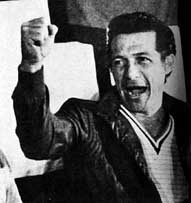Roberto D'Aubuisson
The neutrality of this article is disputed. |

Major Roberto D'Aubuisson Arrieta (August 23 1944 – February 20 1992), a Salvadoran political figure known as Chele (white man) was a Salvadoran politician and military leader who founded the Nationalist Republican Alliance (ARENA), which he led from 1978 to 1985, and the leader and main organizer of the infamous “Death Squads” of El Salvador, one of the most dreadful terrorist organizations in the recent history of Latin America, responsible for the torture and killing of thousands of civilians in El Salvador, previous to and during the civil war in that country (1980 - 1992). He was also known as "Blowtorch Bob," or simply "The Blowtorch," for his preference in using a blowtorch to torture political prisoners.[1][2]
D'Aubuisson was born in Santa Tecla, graduated from the Salvadoran military academy in 1963, and then furthered his studies at the School of the Americas, graduating in 1972. He subsequently joined Salvadoran military intelligence.
From 1978 to 1992, during the country's protracted civil war, he is thought to have been a central figure behind the death squads which were implicated in many extrajudicial killings. These included Archbishop Óscar Romero, one of the most prominent Catholic priests in Latin America. On May 7 1980, six weeks after Romero was assassinated, D'Aubuisson was arrested on a farm, along with a group of civilians and soldiers, in a raid which apparently found a significant quantity of weapons and documents that implicated the group in killing Romero, organizing and financing death squads, and conspiring to bring down the Revolutionary Government Junta (JRG) government, which ruled El Salvador between 1979 and 1982. The arrests triggered a wave of terrorist threats and institutional pressures which culminated in D'Aubuisson's release.
D'Aubuisson's opposition to the JRG brought him to national prominence. On September 30 1981 he founded ARENA, a party that gained support both from among the small wealthy class who feared they would lose everything under the military regime as well as those portions of the general public that wanted to see an end to the violence and social disorder. He claimed that the junta represented a Marxist threat and used his reputation as an anti-leftist and counter-insurgency fighter in order to gain political capital.
A general election for a Constituent Assembly held on March 28 1982 resulted in a victory for ARENA in an election marked by violence [3] and voting irregularities [4] [5]. The party won 19 of the 60 seats, with a further 17 going to two parties in coalition with ARENA, thus giving d'Aubuisson's supporters a clear majority in the Constituent Assembly. The Assembly then chose Álvaro Alfredo Magaña Borja as the interim President, ending the JRG regime in May.
On March 25, 1984 D'Aubuisson ran for President. In the heated campaign environment, one of his favorite campaign techniques was to slash a watermelon open with a machete. D'Aubuisson analogized the watermelon to his opponents in the Christian Democratic Party — green (the party color) on the outside but red (communist) on the inside. He came in second in the first round but lost to the Christian Democratic Party candidate José Napoleón Duarte in the second round on May 2, gaining 46.4% of the vote. He claimed that the election was fraudulent and that the United States, which had openly supported Duarte, had interfered to prevent the Salvadoran people from being able to express their true wishes.
In December 1984 D'Aubuisson visited Washington to attend a dinner held in his honour by a group of US conservative organizations, and to receive a plaque recognising his "continuing efforts for freedom in the face of communist aggression which is an inspiration to freedom-loving people everywhere." [1]
On March 31 1985 ARENA lost its majority in the Legislative Assembly. He resigned as leader of ARENA as a result and Alfredo Cristiani took over the reins. In May 1988, ARENA chose Cristiani rather than D'Aubuisson as their candidate that year; Cristiani was duly elected.
He died from throat cancer in 1992, aged 47, after a long illness. While D'Aubuisson was never convicted during his lifetime of any crimes, former United States Ambassador Robert White told Congress in 1986 that there had been sufficient evidence to convict D'Aubuisson of planning and ordering Romero's murder. White also described D'Aubuisson as a "pathological killer". Both the UN Commission for Truth [6] and the Inter-American Commission on Human Rights[7], in the aftermath of the civil war, determined that D'Aubuisson "gave the order to assassinated the Archbishop" to a group of military officers and attempted to assassinate Judge Atilio Ramírez Amaya "to deter investigation of the case."
Nevertheless, there are some politicians and people in El Salvador who continue to revere the memory of D'Aubuisson. The current president of El Salvador, Antonio Saca, commemorated on January 20 2007 the anniversary of the death of D'Aubuisson, and promised to continue with the ARENA party based on D'Aubuisson's ideology and legacy.
Notes
External links
- "Report of the UN Truth Commission on El Salvador" (1993)
- Democracy Among the Ruins: Citizens struggle with a turbulent campaign (Mario Vargas Llosa's report on the 1984 presidential campaign), TIME, March 26, 1984 (retrieved Nov. 6, 2006)
- Salvadoran Far-Right Leader Ill With Cancer, by Shirley Christian, The New York Times, July 22, 1991 (retrieved Nov. 6, 2006)
- "US role in Salvador's brutal war", BBC World Service, 24 March 2002
- ^ WPost84
